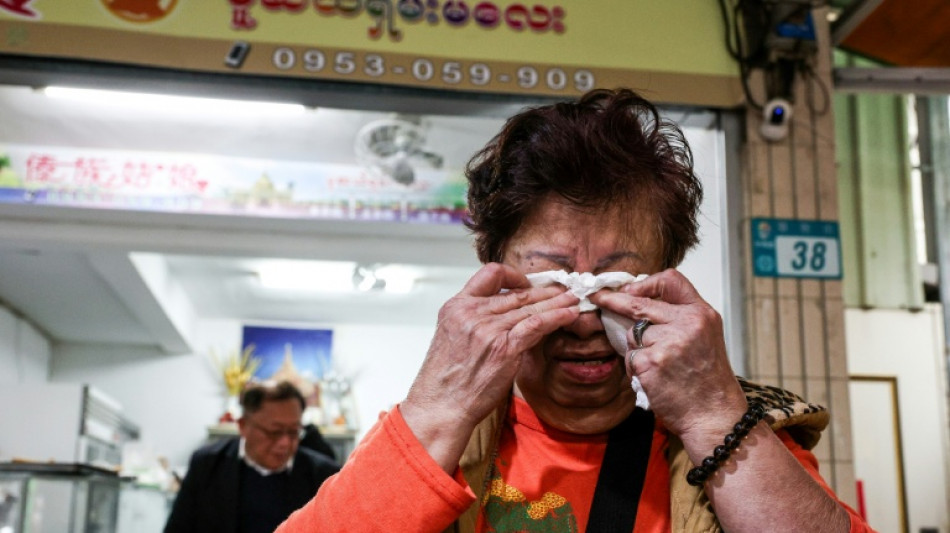

Tears in Taiwan for relatives hit by Myanmar quake
As images of destroyed buildings in earthquake-hit Myanmar flashed across her television screen in Taiwan, Yang Bi-ying could only weep for her family there.
Yang, 76, has lived in Taiwan for more than half her life and has a daughter-in-law in the central Myanmar city of Mandalay, which was devastated by Friday's massive earthquake.
At least 1,700 people have been killed in Myanmar and neighbouring Thailand, and hopes of finding more survivors are fading fast.
Yang said her daughter-in-law was safe and other relatives in Yangon were unaffected by the 7.7-magnitude earthquake and its aftershocks.
"I could only cry. There was nothing else, just tears," the grandmother told AFP at an eatery in a Sino-Burmese neighbourhood near the capital Taipei.
"Every family has been worried, especially for those buried under the rubble. What could be done? Nothing. It's all in the hands of fate."
Three days after the quake struck, many in Taiwan's Sino-Burmese community still feared for their loved ones.
"Several buildings near my family's home collapsed, many people died," said eatery owner Yeh Mei-chin, 48, showing AFP a video of the damage on her smartphone.
It took hours before Yeh was able to reach her mother and sisters in Mandalay on Friday. They were safe, but too scared to go home.
"I asked them where they would sleep that night and they said they were still looking for a place but hadn't found one yet," Yeh said.
People in Taiwan have been using social media platforms, including Line and WeChat, to contact family in Myanmar and monitor the situation.
But internet connection has been intermittent.
"On a lucky day, we may be able to get through a few times," Lee Pei, 66, chairman of the Myanmar Overseas Chinese Association, told AFP.
"Usually, we can only leave messages as voice calls rarely go through. If we do manage to connect, the signal deteriorates after a few words."
- Waiting for friends online -
The Myanmar community in Taiwan dates back to the end of the Chinese civil war in 1949.
Many members of Chiang Kai-shek's defeated Kuomintang nationalist forces fled across the border to Myanmar and later went to Taiwan.
Over the decades, students and people fleeing anti-Chinese sentiment as well as economic and political turmoil in Myanmar have followed.
Pei estimated Taiwan's Sino-Burmese population at 160,000 and said 10 percent were originally from Mandalay.
University student Aung Kyaw Zaw has been following developments on Facebook where he has seen reports that in Sagaing city, near the quake's epicentre, there was a "stench... like the smell of decaying bodies".
The 24-year-old said he had exchanged messages with some friends in quake-hit areas, but "some of them still haven't come online".
There were also concerns that donations sent to Myanmar would not reach the people who need it.
"The junta only cares about fighting wars or other things, but they don't really do much to help the people," said university student Yi Chint, 24.
"I think very little of it would actually go to the people."
T.McGilberry--NG



